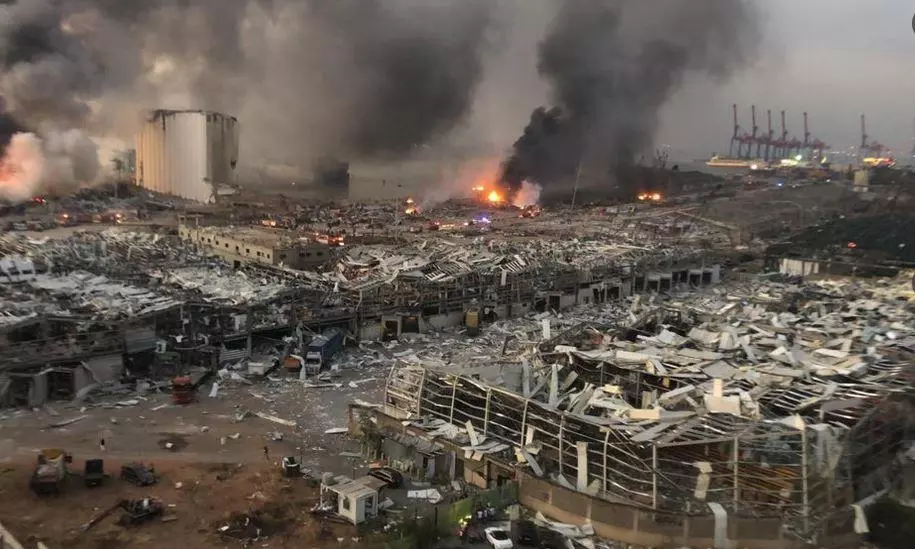
The tragedy that was in the making in Lebanon
text_fieldsImage Courtesy :https://twitter.com
What exploded in Lebanon on Tuesday night, was a tragedy that the government had 'reserved safely' for seven years and gave a lethal blow to the country which has been in a desperate attempt to rise and stand erect. In the terrible explosion that killed over a hundred people and injured nearly four thousand, nearly two and a half lakh people have been rendered homeless, as per Beirut city governor.
For a small country that had already been weak, this was a hit far more than it could take, which forced prime minister Hassan Diab make a desperate appeal to the world to render all help. The words of 38-year old engineer Sami Rifai, sitting beside two daughters injured in the blast and talking to AFP, perhaps captures the sombre plight prevailing all around, "We already had the economic crisis, a government of thieves and coronavirus. I didn't think it could get worse but now I don't know if this country can get up again. Everyone is going to try to leave. I will try to leave".
The blast has wiped off not only the port and its adjacent city that give it its food and water, but also its very life. In the country with half of the population living under the poverty line, with one of the worse debt burdens in the world and inflation ticking up by the day, anything the people need has to be imported. Ninety percent of wheat, the staple diet, is imported from foreign countries including Russia. And now reports say that 85 per cent of the foodgrain stored to feed the population burned in the accident.
Beirut and Lebanon, at one time the dream destination of tourists and pleasure seekers of the world, has now become a ghost location of mere nostalgia that will only disappoint any one. In the civil war that lasted from 1975 to 1990, nearly 1.25 lakh lives were sacrificed and a million people fled the land. And it was only in 2005 that foreign forces, who were party to the country's unfortunate strife left the country. That was followed by the conflict between Hezbollah and Israel and the political turmoil as a result of the former's becoming party to the Syrian crisis. That made the economy all the weaker with a free fall into poverty and the highest debt burden in the world. The government, which any one would expect to help tide over the crisis, only worsened matters with corruption, inefficiency and trading of power, all complicating the matrix further. With the majority of the population taking to the streets in seventy cities in last October last year against governmental corruption and anarchical rule, prime minister Saad Al-Hariri was forced to quit office. That brought only a change of guard but not in the fortunes of the land. In March alone, prices of essential goods tripled and the value of the currency went down by 80 percent. With increasing poverty, crime rate also registered phenomenal increase.
It was into this rain of tragedy that the storm of Covid hit. Although the Covid situation stayed relatively manageable with 5,000 infected and 65 deaths, recent warnings by health authorities caution that disease spread was happening at a rate the country could hardly bear. The country, reeling in hunger and unemployment, had to limit its lockdown to five days, as it could not afford to close down. The latest tragedy will only aggravate the range and impact of this crisis, when Beirut port - Lebanon's only window to the world - and two sides of its land border trapped in war. The tragedy, as most agree, was only of its own making.
The genesis of the disaster is in September 2013, from a Moldova-flagged ship carrying ammonium nitrate from Georgia to Mozambique which had to make a stop at Beirut port due to technical snags. But since Lebanon did not give it clearance to sail through its sea territory, the cargo ship was abandoned. While dispute and legal procedures went on indefinitely, what the Lebanese authorities did was the unforgivable act of off-loading the ammonium nitrate in the port and of holding it in warehouse. Thus the huge blast that took place on Tuesday was only a matter of time. Although the Lebanese customs requested that the potentially fatal cargo be exported, handed over to the military or transferred to any private explosive maker, all such suggestions fell on deaf ears and eventually came the deafening explosions plunging Lebanon into a whirpool of disaster.
Since the incident was a national mishap, prime minister Hassan Diab declared a state of emergency and has vowed to catch the culprits. But when the rulers of Lebanon, who regularly consign the country to anarchy and insecurity, are themselves responsible for all its catastrophe, who is to punish who!






















